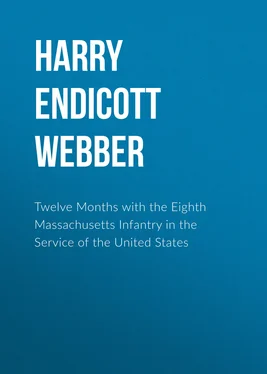Harry Endicott Webber - Twelve Months with the Eighth Massachusetts Infantry in the Service of the United States
Здесь есть возможность читать онлайн «Harry Endicott Webber - Twelve Months with the Eighth Massachusetts Infantry in the Service of the United States» — ознакомительный отрывок электронной книги совершенно бесплатно, а после прочтения отрывка купить полную версию. В некоторых случаях можно слушать аудио, скачать через торрент в формате fb2 и присутствует краткое содержание. Жанр: foreign_prose, История, foreign_edu, foreign_antique, на английском языке. Описание произведения, (предисловие) а так же отзывы посетителей доступны на портале библиотеки ЛибКат.
- Название:Twelve Months with the Eighth Massachusetts Infantry in the Service of the United States
- Автор:
- Жанр:
- Год:неизвестен
- ISBN:нет данных
- Рейтинг книги:5 / 5. Голосов: 1
-
Избранное:Добавить в избранное
- Отзывы:
-
Ваша оценка:
- 100
- 1
- 2
- 3
- 4
- 5
Twelve Months with the Eighth Massachusetts Infantry in the Service of the United States: краткое содержание, описание и аннотация
Предлагаем к чтению аннотацию, описание, краткое содержание или предисловие (зависит от того, что написал сам автор книги «Twelve Months with the Eighth Massachusetts Infantry in the Service of the United States»). Если вы не нашли необходимую информацию о книге — напишите в комментариях, мы постараемся отыскать её.
Twelve Months with the Eighth Massachusetts Infantry in the Service of the United States — читать онлайн ознакомительный отрывок
Ниже представлен текст книги, разбитый по страницам. Система сохранения места последней прочитанной страницы, позволяет с удобством читать онлайн бесплатно книгу «Twelve Months with the Eighth Massachusetts Infantry in the Service of the United States», без необходимости каждый раз заново искать на чём Вы остановились. Поставьте закладку, и сможете в любой момент перейти на страницу, на которой закончили чтение.
Интервал:
Закладка:
As will doubtless be remembered, the Third Division remained in the Park until the 21st of August, when it was transferred to Lexington, Kentucky, where it went into camp on the Bryan road at Clark's Farm, about five miles east of the city. There it remained until November 4th, its official designation was changed by orders from the War Department, to the Second Division, First Army Corps, and on the 10th it was ordered to Georgia, the Headquarters Signal Company, Third United States Volunteers, Engineers, and First Brigade to Columbus, the Second Brigade to Americus, and the Third Brigade to Albany. At this time the Second Brigade consisted of the Eighth Massachusetts, Twelfth New York and Fourth Kentucky, under Brigadier General Waites, U. S. V. The Fourth Kentucky was ordered to be mustered out, leaving the other two regiments to compose the Brigade, and this arrangement was not changed while the Division remained in service.
On the 16th of November I was relieved from the command of the Second Division and ordered to the Second Brigade, relieving General Waites, and was thus brought into closer contact with the Eighth Massachusetts. The Brigade remained in Americus until November 26th when, under orders from the War Department, the headquarters, the Brigade Hospital and the Twelfth New York Regiment, were ordered to Charleston, S. C. en route to Matanzas, Cuba, where it arrived January 1st.
A few days later the Eighth Massachusetts rejoined, and not long thereafter the One Hundred and Sixtieth Indiana, Third Kentucky, Tenth United States Infantry, and six troops of the Second United States Cavalry which composed the garrison of the city and district of Matanzas, and the Second Brigade of the Second Division of the First Army Corps, practically ceased to exist. When the Third Division became the Second Division, Major General Ludlow was assigned to command it. He remained in command until December 17th when I was ordered to relieve him. I rejoined the Second Brigade in Americus December 26th and went with it to Cuba.
The Eighth remained in Matanzas until April 4, 1899, when it sailed for Boston, where it was mustered out of the service of the United States, and reverted to its status as a regiment of the National Guard. While it was not given to the Eighth Massachusetts to undergo the supreme test of the battlefield, it proved beyond the shadow of a doubt by its calm indifference to death in other forms and its devotion to duty, that it would have met that test with a glorified record of good discipline and steadfast courage. Who among all of those who had the misfortune to remain in Chickamauga Park through the summer of 1898, will ever forget the trials and dangers of that encampment? From forty to sixty thousand men huddled together within an area not too large for a sedentary camp of two divisions. 1 1 In 1898, the Park proper contained 5530.4 acres, of which 2032.8 acres were cleared and 3506.6 wooded. Troops on the march may camp or bivouac in the woods with but little risk to the health of the men, but in a sedentary camp the tents must be in the open.
Prior to August 1st the camps of all the regiments of the Third Division, were in the woods with an average of from six to eight men in a tent, many of which were unfit for occupancy. Polluted water, insufficient supplies and protection from the incessant rains of that year, and the fact that neither the camp nor the tents were ever moved, from lack of space, produced their inevitable result, and when the Third Division left the Park, August 21st, there were twenty-nine officers and 1237 enlisted men on the sick report, out of 337 officers and 9464 men present; or, in other words, one officer out of twelve and one man out of eight. Although questioned at the time by those high in authority, it is now well known that a large proportion of the sick had typhoid fever; in fact it was epidemic. 2 2 The records of the War Department show that in August there were 1568 cases of typhoid in the Division and General Hospitals; there were probably as many more in the regiments.
My recollections of Chickamauga Park are not pleasant for reasons which I cannot very well explain here. It is sufficient to say that I was fully cognizant of the wretched conditions which sent the sick report higher each day and subjected the sick in hospital to needless privation and suffering, but was powerless to prevent or ameliorate them. In fact, for administrative purposes, I was very little more than a figure head, although held responsible by the regiments, whose appeals for a relief which never came while we remained in the Park, were most distressing to me. At that time the collapse of the war had not been foreseen, and although the Spanish forces in the eastern district of Santiago, Cuba had capitulated July 16, it was not until the protocol of August 12th, providing for a cessation of hostilities, that we felt the war was over and that the Third Division would probably never fire a hostile shot. In the meantime, however, under the orders of the Corps Commander, the Division was held in readiness to move at a moment's notice, and every effort was made to prepare it for service against the Spaniards.
To this end, and on the day after I assumed the command, orders were issued to prepare the Division for active service in accordance with the instructions of the War Department. These prescribed the clothing, ammunition, and rations to be carried on the person and in the two wagons allowed each company,—all other clothing and all other personal belongings of the men to be packed in boxes legibly marked with the company and regiment, and turned over to the depot quartermaster for storage or shipment. To render the officers and men expert in packing, and to determine just what could be carried under the instructions referred to, each regiment was required to strike tents and pack up, after which it was marched to the regimental parade grounds, followed by its wagons, and inspected by the Brigade Commander. It was well understood that all regimental and company property which had not been disposed of when marching orders were received, must be abandoned.
As up to the time I assumed command of the Division there had been no target practice, on July 1, Major Edward H. Eldredge, of the Eighth Massachusetts, was appointed Inspector of Rifle Practice, and preparations were at once made to begin target practice. Nothing could have been more fortunate than the selection of the major for this most important branch of instruction. Conscientious, enthusiastic, and thoroughly competent, he had the target ranges established, and the Division at work firing within a week, and this was continued daily (Sunday excepted), until just before the Division left the Park.
On July 26 a division rifle competition was held, each regiment furnishing a team of 12 men; ten shots were fired off hand by each man, at 160 yards (possible score 600 points). The highest score was made by the Eighth Massachusetts with 481 points; the lowest score was 409.
In the course of the instruction it was found that many men had never fired a gun and were correspondingly ignorant of this most important requirement. What would they have done in the line of battle? Well, I will tell you. Those who were not killed would have been perfectly demoralized until they either ran away or perhaps were wounded, in which case they would have added vastly to the cares of the Division Commander and his medical staff. In either case, they would have been of no possible use except as stretcher bearers. Nothing could be more objectionable on the part of the high military authorities than to send such men under fire, and there is no possible excuse for it.
Other measures taken to prepare the Division for active service were careful instruction in guard duty, the service of advance guards and outposts, by battalions and regiments; litter drill and "first aid."
Читать дальшеИнтервал:
Закладка:
Похожие книги на «Twelve Months with the Eighth Massachusetts Infantry in the Service of the United States»
Представляем Вашему вниманию похожие книги на «Twelve Months with the Eighth Massachusetts Infantry in the Service of the United States» списком для выбора. Мы отобрали схожую по названию и смыслу литературу в надежде предоставить читателям больше вариантов отыскать новые, интересные, ещё непрочитанные произведения.
Обсуждение, отзывы о книге «Twelve Months with the Eighth Massachusetts Infantry in the Service of the United States» и просто собственные мнения читателей. Оставьте ваши комментарии, напишите, что Вы думаете о произведении, его смысле или главных героях. Укажите что конкретно понравилось, а что нет, и почему Вы так считаете.












